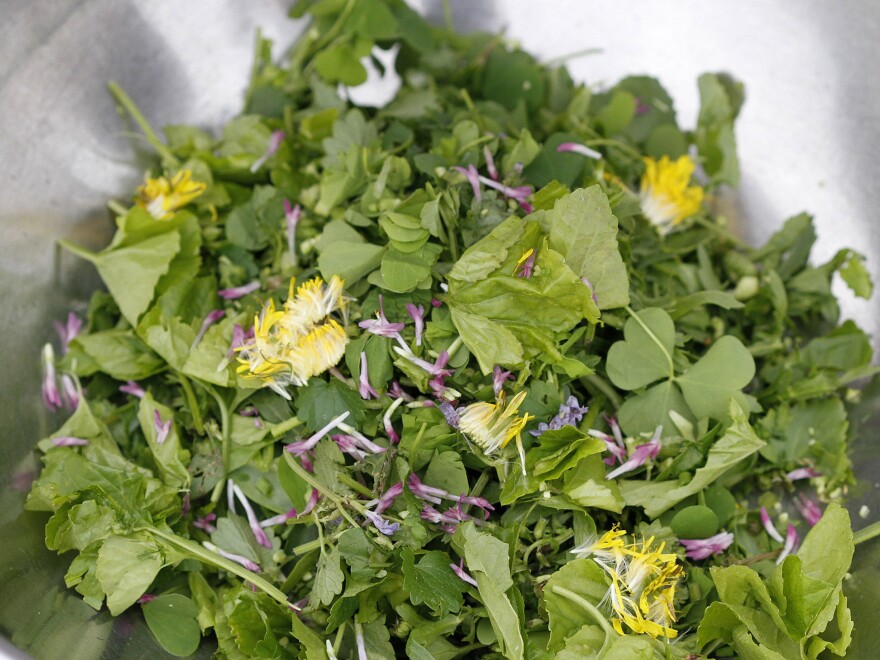
For one Vermont couple, "local" doesn't mean heading to the farmers market. It means finding a natural salad bar at your picnic spot — or maybe even in your backyard.
Nova Kim and Les Hook live on a lush farm between a large lake and the Connecticut River near the Vermont-New Hampshire border. Over the decades, they've become skilled gatherers of edible wild foods, which they sell to high-end restaurants. But on this drizzly day, they're in their own kitchen, making dressing for a picnic green salad.
With her gray hair in a skinny braid down her back, Kim grinds dried wild ginger root. Hook, also long-haired, minces up wild ramps and leeks. The pungent bulbs are no bigger than a pencil eraser.
"You can use them like you use onion and garlic," Kim explains. "It's a combination of the two and it can be kind of an intense flavor."
Kim drops about two tablespoons of each wild ingredient in a glass pint jar. She adds about five tablespoons of lemon juice and a cup of melted coconut oil, which she thinks tastes better with wild greens than heavier olive oil.
"This is my kind of mixing: Put it in the jar and shake," she says. "I'd like people to understand they can do this right in their own yard."
Kim doesn't always know exactly what she might find beyond their property. And it's important, she says, to harvest where there has been no chemical spraying. So before leaving the yard, she tucks some common plants — some might call them weeds — in cellophane bags. Kim and Hook say plastic ruins delicate pickings.
"I'm going to pick a little bit of this stuff here," Hook says, reaching for some greenery.
"That going to be enough?" Kim asks. "Oh, you are doing the henbit?"

Henbit has small, dark scalloped leaves and tiny purple blossoms along the stalk. Suburban landscapers hate it, but Kim says rural gourmets love it.
"Our chefs compare it to balsamic mint," she says.
With walking sticks and woven-basket backpacks, Kim and Hook head downhill through a pasture toward a stream. They collect dandelions, violet blossoms, wild sedum, sorrel, and lots of watercress. As storm clouds gather, they settle down on a stream bank for a healthy al fresco lunch.
The couple's wild salads tend to be finely minced. Each crunchy bite of this one tastes a little bitter, a little sweet and a little sour, especially after adding the tangy ginger-root dressing.
If you aren't good at identifying plants, or knowing which ones are safe, pack a reliable field guide. Hook and Kim rarely pull anything out by the roots, unless the tubers are what they need most. And they pick most greens toward the top of a stalk, so the plants will keep growing and supplying them with fresh salad fixings all summer long.
Hook munches slowly and offers his trademark maxim: "Step out your back door, and eat forever more."
Copyright 2020 NPR. To see more, visit https://www.npr.org. 9(MDAxNDQ2NDAxMDEyNzU2NzM2ODA3ZGI1ZA001))






